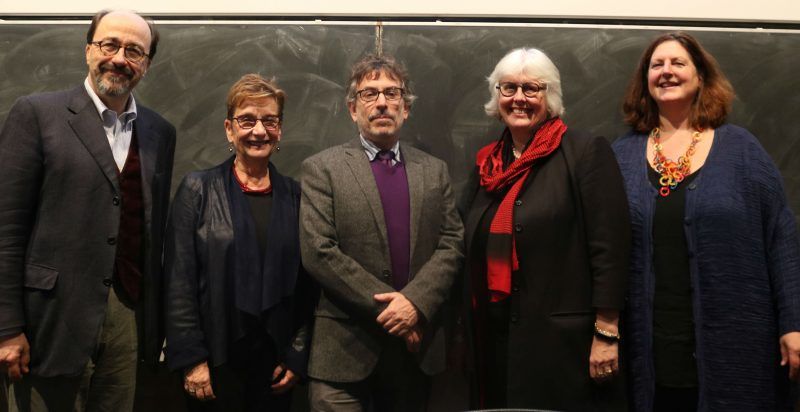Democracy and populism debated on eve of US elections
Posted on: 06 November 2018
Public discussion in Trinity College Dublin looked at the rise of populism, the erosion of democracy and the past events and ‘cultural trauma’ which might be to blame.

As part of the Behind the Headlines public discussion series, the Trinity Long Room Hub Arts and Humanities Research Institute hosted a free public discussion entitled ‘Crises of Democracy’. On the eve of potentially historic mid-term elections in the US, the event heard from a panel of experts from Trinity and Columbia University who explored the growth of populist and authoritarian approaches to government world-wide and traced the roots back to past traumas in society.
At the event, Rosemary Byrne, Associate Professor in International Law, Trinity, explored what it means in the world today to speak of ‘democracy in crisis’ asking if we are experiencing a demise of democracy or merely a ‘recession in democracy’.
“We need to be careful about the terminology. If our American colleagues go back to America on Wednesday morning, and they’re confronted with thousands of triumphant red baseball caps, they may be disappointed but that does not make a crisis”, she said, continuing to discuss the real signs of democratic erosion.”
“A crisis if we think about democracy, is about constitutional democracy, it’s about checks and balances. It’s about pluralism. It’s about really maintaining a civil space so that vibrant political participation is possible. Moving away from the “theatre of politics in America,” to Europe, she argued that in Hungary and Poland, we are seeing the dismantling of constitutional structures. This is where “the crisis is really in our home terrain.”
Bill Emmott, journalist and author, and former Editor-in-Chief of The Economist, examined the case of Italy and its recent elections. In March of this year the populist and nationalist parties had a huge impact, forming a government “after an election winning half of the seats in parliament, with support in the opinion polls of more than 60% of the population”, in something which could actually be seen as a “triumph of democracy”, Mr Emmott commented, questioning, however what it might lead to.
While Mr Emmott argued that Italy had already elected in 2001 Silvio Berlusconi, “the great populist innovator of Western European Politics”, and a man who “was Donald Trump before Donald Trump” the recent elections of two anti-establishment parties had been a long time coming:
“It was a logical, perhaps inevitable outcome of more than two decades of economic stagnation which had deprived many in the younger generation of hopes of social mobility or even family formation. And that long stagnation can be traced to a social and economic rigidity, extreme even by West European standards, created during a profound left-right divide during the 1960s and 1970s, which yielded Europe’s second largest post-war toll of politically related deaths (after Northern Ireland).”
Marianne Hirsch, William Peterfield Trent Professor of English and Comparative Literature, Columbia University, looked at statelessness and nationalism arguing that art practices can help us imagine alternative relationships between contemporary subjects, citizenship and home:
“What can art do in the face of statelessness in the crisis of democracy? Despite the dire conditions faced by stateless people across the globe in our current moment, and their dependence on nation-states for citizenship and rights, this talk, counter-intuitively, wants to claim statelessness as a means through which we can think beyond the constraints of nations and nationalism.”
Art practices, Professor Hirsch noted, can acknowledge the “violence and vulnerabilities” of forced migration, looking at “victims of expulsion” immobilised by the “weight of the past.”
Professor Bruce Shapiro, Executive Director of the Dart Center for Journalism and Trauma, Columbia University, explored journalism and the politics of resentment on the eve of the mid-term elections in the US:
“Authoritarian populism is at once powered by news media and threatens independent journalism. How can journalists navigate a global tide of polarization, violence against sitgmatized groups and crisis for democracy? Can the institution of independent news survive?”
Bruce Shapiro said he was speaking as a journalist in the wave of violent attacks on journalists in the US who have been branded as enemies of the people by the President of the United States.
“This dual scapegoating once of immigrants but also of journalists is central to the authoritarian populism that we are seeing rise in the United States and around the world.”
One of the key differences and changes facing journalism today, he said, is that oligarchs and authoritarian figures don’t need journalists any more. “Authoritarians have never much liked journalists but it is a little different now from other eras. Because of social media, authoritarians as well as oligarchs, as well as narcos, as well as terrorists, can all speak to their followers directly over the heads of news professionals.”
The event formed part of a day-long symposium at Trinity Long Room Hub which was run in partnership with the CHCI-Mellon Crises of Democracy Global Humanities Institute and Columbia University. The ‘Crisis of Democracy and Cultural Trauma’ symposium was held in the Trinity Long Room Hub with experts from Trinity and Columbia universities exploring the crises of democracy through the prism of cultural trauma. Speakers explored how by turning to the past to fund specific times, events and experiences in the collective lives of culture which contribute to current crisis. Panel discussions were formed around topics such as ‘Memory and Trauma’, ‘Media and Technology’, and ‘Historical Context’ and ‘Framing and Responses’.
The ‘Behind the Headlines’ discussion series hosted by Trinity Long Room Hub Arts and Humanities Research Institute offers background analyses of current issues from experts from the fields of arts and humanities research. The series is supported by the John Pollard Foundation.
